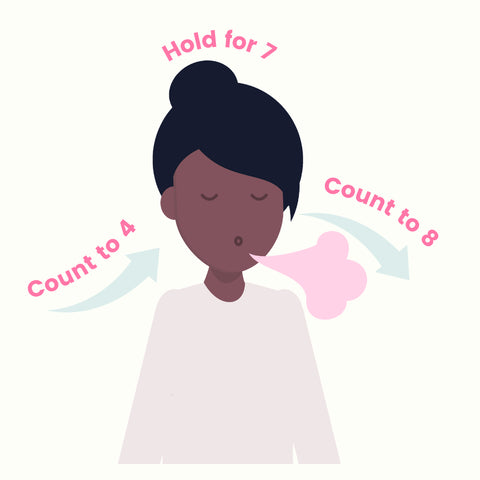Elevated heart rate, sweating, feelings of nervousness or restlessness; sound familiar? These are a few anxiety symptoms, and if you're among the 8 million people experiencing anxiety in the UK, you're probably in need of a healthier outlet to deal with it. Anxiety has a way of consuming its victims, and if you're tired of feeling shackled by this mental illness, here are some proven ways to regain control of your life and emotions.

Four Science-backed Ways to Deal With Anxiety
Here are four practical research-backed ways to deal with anxiety.
1. Breathe
It may seem as cliche as the 'just breathe' mantra, but research studies show that practising focused, deep breathing is an excellent way of combating anxiety. Here's how it works. Typically, increased heart rate indicates a panic or anxiety attack, and you manually slow your heart rate by evening out your breath via deep breaths. Thus, calming yourself down. Many doctors recommend the 4-7-8 breathing technique for anxiety.

This technique involves inhaling for four seconds, holding that breath for seven seconds, and exhaling from your mouth for eight seconds. Once this cycle is complete, the next breath you take initiates a new breath cycle. Beginners to this technique are advised to practice four breath cycles with the 4-7-8 technique and work their way up to eight full breath cycles.

2. Get active
Exercise is a proven stress reducer, according to several research studies. Physical activity releases hormones that help you feel good, plus it's a great way to stay healthy, so it's a win-win. Developing a routine where you're active most days of the week will reduce the anxiety in your life. We're not expecting you to be as committed as Dwayne Johnson right away. You have our blessings to pace yourself and take it slow before increasing the intensity. You can do this by starting with a walk or even doing Yoga. Physical activity will give your mind some needed downtime.

3. Put a ring on it
If you're familiar with how fidget spinners work, you already know what an anxiety ring is. Like a promise ring or most types of rings worn on any finger, the anxiety rings may help curb anxiety. Such rings are either designed with beads that can be rolled around. They also take the design of several bands which twist around if moved with the fingers or thumb.

According to research by Dr Childs of the Center for Adult Behavioral Health, anxiety rings help with self-soothing. The patient can feel relief by concentrating on spinning the ring whenever the anxiety kicks in. Doing this distracts you from your emotions, redirects your thoughts, and helps ground you.
 4. Aromatherapy
4. Aromatherapy
Studies have proven that using aromatherapy on anxiety patients can significantly decrease their anxiety levels. Since aromatherapy is found in essential oils, incense or candles, using either of these items can shift one's anxiety levels. The aromatherapy in essential oils and candles helps activate crucial brain receptors, thus easing anxiety. Therefore, inhaling such items will help you de-stress while uplifting your mood.

Conclusion
Anxiety might be a form of mental illness, but it shouldn't control your life anymore. You can gain some semblance of control by engaging in physical activity, pacing yourself to practice deep breathing, and using anxiety rings and aromatherapy.


